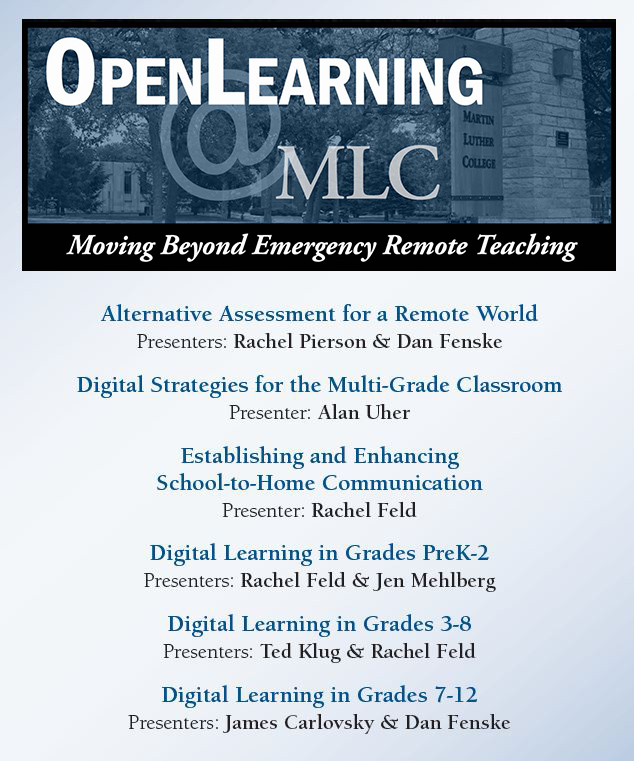1,000 Teachers Enroll in First Virtual Conference
When the world of education went from brick to click almost overnight last spring, WELS teachers adapted quickly—and so did Martin Luther College.
Preschool, elementary, and high school teachers across the synod employed emergency remote teaching strategies so their students could keep learning. But the teachers knew that once the emergency was over, once the semester was finished and they’d have time to plan more thoroughly, they could do even better.
Could MLC Offer Assistance? Some WELS teachers reached out to MLC’s Continuing Education Office for guidance, so Dr. John Meyer DMLC ’87 met with a team of MLC experts to consider how best to meet these requests. Director of Academic Computing Rachel Feld MLC ’06, Webmaster/Instructor Bob Martens MLC ’09, Professor Dan Fenske DMLC ’87, and Dr. James Carlovsky MLC ’10 quickly developed an online conference. Titled OpenLearning@MLC: Beyond Emergency Remote Teaching, the conference would be the first of its kind at MLC: virtual, open, and free.
“True online learning requires all sorts of planning and pedagogical adjustments that neither our MLC professors nor our WELS teachers had the time to do in the spring,” said Feld. “We all made the best of a not-awesome situation. For our conference, we wanted the focus to be on taking what we learned from our experience in the spring and making it better in the fall.”
According to the plan, MLC would present six online sessions designed to meet the needs of teachers at all levels. The sessions would be presented live and then archived for those not able to watch live.
The virtual conference was new. It was necessary. And with the help of Communications Specialist Valerie Fischer, it was launched. Within two weeks, 1,000 people had registered. MLC faculty members Rachel Feld, Bob Martens, James Carlovsky, and Dan Fenske developed OpenLearning@MLC, a free online conference for WELS teachers, in a matter of weeks. “I was impressed with how quickly and enthusiastically our faculty acted to support Lutheran teachers,” said Dr. John Meyer.
One thousand teachers! “Our WELS teachers were definitely superstars this spring,” said Feld. “They went to amazing lengths to ensure their students continued to have a Christian education. The huge enrollment number in this conference just emphasizes their superstar-ness. Even though the last thing most teachers (myself included) want to think about is returning to online teaching in the fall, they tuned in to this conference to fill their online teaching toolbox for their students.”

With an upgraded Zoom account to accommodate all the connections, the session leaders presented their strategies and tips on June 16-17. “We’d thrown around the idea of 100 live participants being an amazing success,” Martens said. They had no idea that more than five times that number would tune in live, ready to listen and ready to chat. It was astounding. Feld said, “Whole faculties watched together (social-distanced, I’m sure) and discussed how they can use what they’ve learned to make an online learning plan for the next school year, just in case. The dedication to their students and to serving their Savior is what makes our WELS teachers so fantastic.”
The Q&A periods at the end of each session were telling as well. “The Q&A told me that teachers used a lot of different tools and ideas last spring,” Martens said, “and they’re eager to share what worked and what didn’t in their classrooms.”
Keeping the conversation going: Looking ahead, the Continuing Ed Office hopes to expand on the original conference concept. “I’m excited about what might be possible when we can start having slower, more considered discussions around what we can do,” Martens said. “I’ve always been a huge fan of being open, sharing freely, and collaborating across the board so that we can get the best ideas in front of the largest number of people.”
More immediately, the conference organizers want to keep the current conversation going. They know that the conference was a springboard for discussions: Which tech tools are best? Why use a tech tool here and not here? How can tech augment, not replace, in-person teaching?
Most important will be listening to what teachers need. MLC wants to meet WELS teachers’ needs so that they can meet their students’ needs. “That’s how we as a synod can keep providing a high-quality, gospel-centered education to the students and families of our schools,” said Feld.
For the sake of the gospel: And the gospel, ultimately, is the most important part. “Even as the circumstances and delivery methods change, the Great Commission does not change,” said Martens. “So we humbly sit at the foot of the cross and ask how we can continue to reach out even during these difficult times.”





